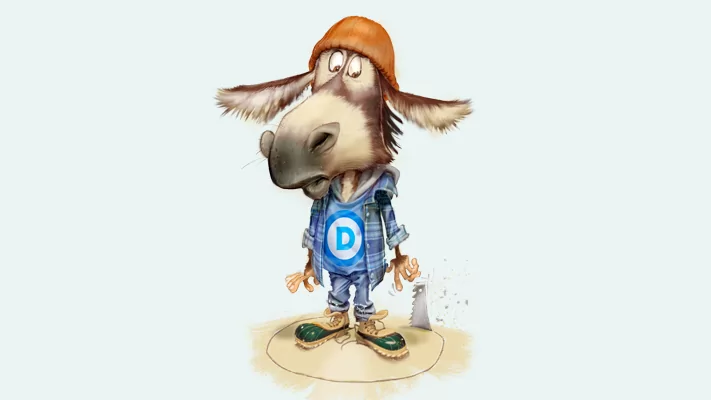
John Spellman vacated the Washington governor’s mansion, a Georgian-style structure on state Capitol grounds in Olympia, in early 1985. Since then, no Republican has gone to the residence of the Evergreen State’s chief executive except to visit. GOP legislators occasionally grouse about the stinginess of invitations.
Democrats have owned the chief executive office for going on 40 years, the longest GOP shutout of any state. Even Massachusetts, Illinois, Rhode Island, and Hawaii have had Republican governors in that time. Former elected King County Sheriff Dave Reichert, also a former congressman, has only an outside chance of upsetting state Attorney General Bob Ferguson’s bid to move up.
And yet, if voters pass a quartet of referendums, it almost won’t matter who controls the governor’s mansion. Gov. Jay Inslee (D-WA) has ruled the state for three terms. These initiatives threaten to undercut his legacy and pull the rug out from under Democratic state House Speaker Laurie Jinkins while they’re at it.

The initiatives are I-2066, which would head off a de facto natural gas ban in new construction; I-2117, which would eliminate the cap-and-trade carbon tax on fuel and undercut a series of green infrastructure projects; I-2019, which would eliminate the state’s new capital gains tax; and I-2124, which would let workers opt out of a payroll tax for the state’s actuarily questionable long-term care insurance plan that Jinkins spearheaded.
Inslee is the most concerned about the carbon tax, his signature achievement, though he has also been outspoken in his opposition to natural gas. “This defective, deceptive, dangerous initiative only guarantees one thing, and that’s more pollution,” Inslee warned of I-2117 at a July press conference.
The retiring governor has proposed tax credits of about $200 annually for middle-class and poor Washingtonians to take some of the sting out of the law. It currently costs drivers about 43 cents per gallon at the pump, with higher prices coming next year, on top of the state’s 52 cents per gallon gas tax.
Inslee launched a “No on 2017 Road Trip” in October. He has been holding rallies around the state and knocking on doors to try to get Washingtonians to vote against it.

Ben Tindall, executive director of the Washington advocacy group Save Family Farming, argues that voters should not buy that sales pitch.
“The Climate Commitment Act has cost Washingtonians over $2.2 billion in the past year alone,” he told the Washington Examiner via email. The estimated cost to the farming community was in the “hundreds of millions of dollars since the carbon pricing scheme went into effect in 2023.”
Tindall described the current climate regime as a “state-orchestrated cash grab.” He complained that the state Department of Ecology “continues to ignore the farm-fuel exemption that agriculture was granted in the statute.”
Ferndale resident Gary Dyck isn’t so pointed in his criticism and said he thinks some of the things that the government is pursuing might be at least well intentioned. At the same time, he’s likely to vote for I-2117.
Dyck complained about the lack of containment of Washington wildfires, for instance, despite increased funds to reduce such threats. He is all for salmon restoration efforts that make sense but is watching legally mandated culverts being installed in places “that weren’t fish-friendly in the first place.”
He also said he doesn’t think that some of the more high-tech infrastructure improvements have been made truly inclusive.
“As a person who owns a pickup, I see all these EV charging stations going in, but no infrastructure has been put in place for someone who tows,” he said.
Machine politics vs. direct democracy
That climate regime might fall in November, or it might not, and the same is true for all of the other initiatives. Early polling had Washington voters favoring the measures. Then the state’s well-oiled Democratic machine went to work.
Inslee, Ferguson, and other elected Democrats and officially nonpartisan progressives in government and media have been tearing the initiatives down using a two-part strategy. The first part is warnings of the great harm that repeal would do to various government programs, the environment, and your elderly grandma.
To that end, legislators rejiggered the law on initiatives to get what supporters charge is prejudicial ballot language added. For instance, in the matter of the long-term care tax, voters have this warning to climb over: “This measure would decrease funding for Washington’s public insurance program providing long-term care benefits and services. Should this measure be enacted into law?”
The second part might be called the deplorablization of Washington politics by smearing those people who support the initiatives. Yakima Mayor Janice Deccio field-tested this strategy when she called the police last Labor Day to report “some far-right-wing petitioners” at the local Walmart.
Defend Washington is a progressive group that has taken out ads urging a no vote on all of the initiatives. One ad specifically targeted the man who did the most to get the measures qualified for the ballot by paying roughly $6 million of his own money for signature gathering.
“There are a lot of misleading initiatives on the ballot this year, and all of them were put there by this guy,” the narrator says, introducing footage of Brian Heywood, speaking at what looks to be a city council meeting.
The ad calls Heywood “a millionaire hedge fund manager who moved here from California” and underscores this with a map of the West Coast with helpful arrows pointing north. His initiatives would “make critical cuts to education and healthcare programs and put our air and water at risk just to give tax breaks to superrich guys like him,” the ad says.
It closes by warning Washingtonians, “Don’t let some hedge fund millionaire control our future. Vote NO on all the statewide initiatives on your ballot.”
Three wins already
Whether the warnings have produced genuine skepticism or simply made supporters less likely to admit what they really think to pollsters is a question that will be settled when Washington’s notoriously long election counts end — hopefully by Thanksgiving.
But the push to bring direct democracy back to Washington after a long hiatus had already scored three big wins before a single ballot was cast. Heywood’s group Let’s Go Washington began most of these items as initiatives to the legislature. Elected representatives can either pass them or pass them on to voters.
After much guffawing, Democrats in Olympia passed three of the initiatives in this year’s session. One initiative put the kibosh on a state income tax. Another added disclosure requirements for schools to send to parents about their children’s records and curriculum. The third was the real doozy, nullifying Washington’s much-mocked police pursuit law.
Based on a single flawed, nonpeer-reviewed study, the Washington legislature had passed a law that made it extremely difficult for officers to chase most criminals. They had to get special permission from higher-ups in most cases, and that permission was subject to strict scrutiny.
It became common for motorists who were pulled over simply to drive off, knowing the officer couldn’t give chase. One man who was being pursued on suspicion of kidnapping called 911 and told the operator to call off the cars “because of the law.”
Minority Republicans in the state legislature had pleaded with the Democrats to amend the law, but the majority party would give little ground. The initiatives changed things. Facing likely repudiation at the hands of voters, Democrats caved and went along with a repeal of their own reform.
It’s a gas, gas, gas
I-2066 stands out because it was not part of the original slate of Let’s Go Washington’s initiatives to the legislature. A state board arguably exceeded its authority by nixing natural gas as a heating source in new developments in favor of electric heat pumps. The Building Industry Association of Washington strenuously objected to this, and Heywood’s group lent support.
Initiatives need somewhere in the neighborhood of 325,000 signatures to qualify for the ballot, though practically many more than that because of accidental wrong addresses, prank signatures, duplicates, and the like. It is very difficult to qualify initiatives in a short time frame.
The Washington Examiner contacted Heywood in late May to ask him how much of an uphill climb he was facing for getting enough signatures. He responded, via text, that “timing is our only enemy” with a July 5 drop-dead date.
CLICK HERE TO READ MORE FROM THE WASHINGTON EXAMINER
He said the initiative is “super popular and the signature ask is probably the easiest of the 7.” For context, Heywood said, “Last year in six months we had 1,025 requests on our website for sheets to sign. This year in 1.5 weeks we are already at 2,000 requests.” Therefore, he said, “I think we have a very strong shot at making it.”
That confidence was well founded. With a week to go, the BIAW reported over 328,000 signatures gathered. At the bell, it turned in over 400,000.
Jeremy Lott is author of The Warm Bucket Brigade: The Story of the American Vice Presidency.




